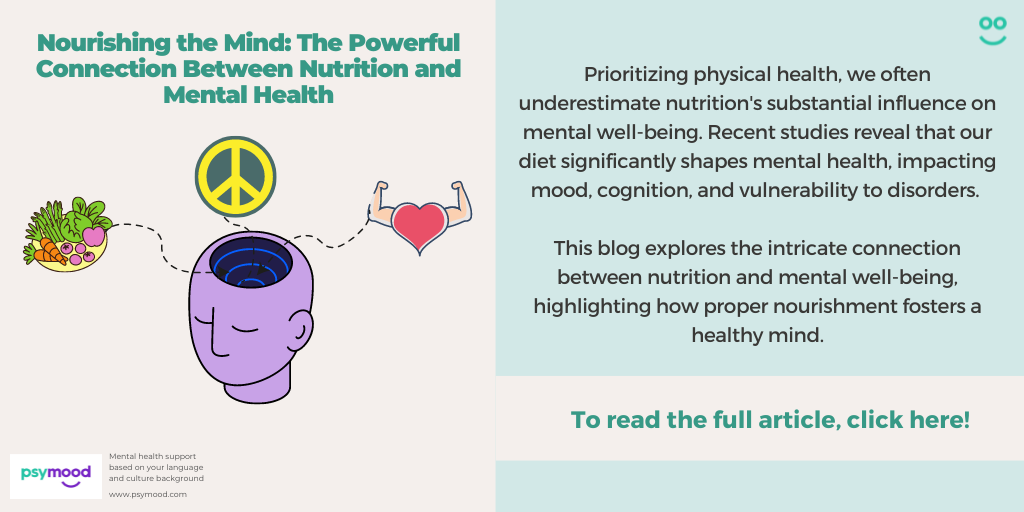Nourishing the Mind: The Powerful Connection Between Nutrition and Mental Health
In the pursuit of overall well-being, we often focus on physical health while overlooking the profound impact that nutrition can have on our mental wellness. Emerging research suggests that the foods we consume play a vital role in shaping our mental health, affecting mood, cognition, and even the risk of mental health disorders. This blog takes a look into the intricate relationship between nutrition and mental well-being, and how good nutrition nurtures our minds.
The Gut-Brain Connection
The gut-brain connection, a two-way communication pathway between the gut and the brain, has garnered significant attention and research in recent years. Our gut microbiota, (the trillions of microorganisms residing in our digestive system), play a vital role in this connection. A balanced and diverse gut microbiome is linked to better mental health outcomes, with studies suggesting that an imbalance could contribute to mood disorders such as depression and anxiety. A happy gut makes a happy brain.
Nutrients for Mental Wellness
Certain nutrients are particularly beneficial for mental health. Nutrients like omega-3 fatty acids, commonly found in fish like salmon or other foods like flaxseeds, are associated with reduced risk of depression and improved cognitive function. B-vitamins, typically found in whole grains, leafy greens, and lean meats, support the production of neurotransmitters that regulate mood. Antioxidants in colorful fruits and vegetables help combat oxidative stress, which is linked to mental health disorders. It is important to get a little bit of everything to maintain a happy and healthy body.
Foods to Avoid
Certain foods are best consumed in moderation or avoided altogether for the sake of both physical and mental well-being. While occasional indulgences are normal and generally okay, regularly consuming the following foods may have negative effects on mental health.
Excess Sugar: Highly processed sugary foods and beverages can lead to energy crashes, mood swings, and contribute to inflammation, potentially affecting mental health. While some sugar is okay, it is important to limit it as an excess can lead to various health issues.
Trans Fats: Trans fats are found in many processed and fried foods generally found in fast foods. Trans fats are associated with an increased risk of depression and cognitive decline.
Processed Foods: Foods high in additives, artificial colors, and preservatives may contribute to mood disturbances and have negative effects on overall health. Recent research shows that processed food colouring such as Red-40 and Sunset Yellow FCF are linked to hyperactivity and mood disturbances.
Artificial Sweeteners: Some studies suggest a link between artificial sweeteners and negative mood effects, although more research is needed.
Highly Caffeinated Beverages: While moderate caffeine intake can boost alertness and mood, excessive consumption, especially close to bedtime, may disrupt sleep patterns and contribute to anxiety.
Alcohol: Excessive alcohol consumption can negatively impact mood, increase the risk of depression, and interfere with quality sleep.
Highly Salty Foods: An excess of sodium can lead to dehydration and affect overall mental well-being, particularly if it impacts bodily functions.
The Role of a Balanced Diet
Adopting a balanced diet rich in whole foods, lean proteins, fruits, vegetables, and healthy fats can promote mental wellness. The Mediterranean diet, known for its emphasis on these components, has shown promising results in reducing the risk of depression and cognitive decline.
Practical Tips for a Mind-Nurturing Diet
- Prioritise whole foods and limit processed foods.
- Consume a variety of colourful fruits and vegetables for antioxidants.
- Incorporate sources of lean protein, like poultry, fish, and plant-based options.
- Include omega-3-rich foods like fatty fish, chia seeds, and walnuts.
- Choose complex carbohydrates from whole grains for sustained energy.
- Stay hydrated, as even mild dehydration can affect mood and cognition.
Final Thoughts
Just as our bodies thrive on nutrient-rich diets, our minds also benefit from thoughtful food choices. The connection between nutrition and mental health highlights the potential for positive change through dietary adjustments. By embracing a diet that nourishes both our bodies and minds, we can take significant strides towards promoting mental wellness and cultivating a balanced, vibrant life.
PsyMood is a digital tool designed to help you find the support you need in the language that you are most comfortable with. PsyMood considers cultural background, geographical location, interests, and personal needs, amongst other factors, to pair you with service providers for either online or in-person therapy sessions.
For More Interesting Posts
You may also be interested in learning more about Balanced Living: Measuring All Aspects of Health and Food and Mental Health!


.png)
.png)
.png)
Recent Comments